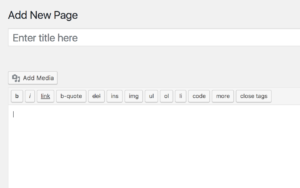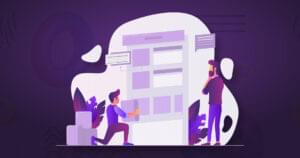Fish or Cut Bait? How Knowing the Difference Helps Your Marketing
A sales manager of mine once told me that you need to know when to fish and when to cut bait. Although I don’t fish, the analogy wasn’t lost on me. In sales, there’s a saying: “If you’re going to lose, lose early.”
You may have heard the acronym AIDA used to describe the buying process. It stands for:
Attention
Interest
Desire
Action
I once read a comment someone heard from a car salesman: “I don’t want the person that is in the beginning or middle of the buying process. It’s too much work to help educate them and they always seem to buy somewhere else if at all. I want the person that is done searching and is ready to buy.”
People who are at the ‘action’ stage are ready to buy. These are the best prospects you could ask for. That’s why Yellow Pages and search marketing are so successful, because the people who use them already know what they want—they’re just searching for someone to buy from.
On the other hand, that uneducated potential buyer might be your next prospect. People who are at the ‘attention’, ‘interest’, or ‘desire’ stage are what the car salesman described as being “in the beginning or middle of the buying process”. The problem is, many of these will never reach the ‘action’ stage. So how do you know who to invest time on and who not?
Finding prospects at the end of their buying cycle is a crucial component in sales. But talking to potential clients early in their buying cycle is relationship-building—and it’s a key component in your marketing. The former is hunting; the latter is farming. The trick is knowing whether you’re selling or whether you’re marketing, and adjusting your behavior to fit.
For example, I met someone at a chamber meeting who told me that he might need my services. So when I phoned him, I was making a sales call. But it soon became apparent that this person was nowhere near ready to buy. So I switched to relationship-building mode—that is, I didn’t try to set an appointment, but spent about 20 minutes with him, offered some advice, then referred him to an article on my website that had more information. I continued to drip-market to him, but I didn’t waste time pursuing him as if he were a lead.
In the web business, if you take the car salesman’s attitude, you’ll never build enough relationships to develop any marketing gravity, so you’ll always be on the hunt for that next person who’s “ready to buy.” Yet, if you constantly take the “relationship-building” approach—freely meeting and talking to anyone and everyone, and giving away all kinds of free advice—you’ll always be a valuable source of free information that nobody ever buys from.
Frequently Asked Questions (FAQs) about “Fish or Cut Bait” in Marketing
What does “Fish or Cut Bait” mean in the context of marketing?
In the marketing context, “Fish or Cut Bait” is a metaphorical phrase that refers to the decision-making process. It’s about deciding whether to continue investing time, effort, and resources into a particular marketing strategy (fishing) or to stop and try something different (cutting bait). It’s about making tough choices and taking calculated risks to achieve marketing goals.
How can I apply the “Fish or Cut Bait” concept to my marketing strategy?
Applying the “Fish or Cut Bait” concept to your marketing strategy involves regular evaluation of your marketing efforts. If a particular strategy isn’t yielding the desired results, it might be time to cut bait and try a different approach. This could mean changing your target audience, adjusting your messaging, or trying a new marketing channel.
What factors should I consider when deciding to “Fish or Cut Bait”?
When deciding to “Fish or Cut Bait”, consider factors such as the return on investment (ROI) of your current strategy, the potential benefits of a new approach, and the resources required to make a change. It’s also important to consider the potential impact on your brand and customer relationships.
How can I measure the success of my decision to “Fish or Cut Bait”?
The success of your decision to “Fish or Cut Bait” can be measured through key performance indicators (KPIs) such as sales, customer engagement, brand awareness, and customer satisfaction. It’s important to set clear, measurable goals before making a decision and to regularly monitor your progress towards these goals.
Can the “Fish or Cut Bait” concept be applied to other areas of business?
Yes, the “Fish or Cut Bait” concept can be applied to any area of business where decisions need to be made about resource allocation. This could include product development, hiring, and strategic planning.
What are some examples of “Fishing” and “Cutting Bait” in marketing?
An example of “Fishing” in marketing could be continuing to invest in a social media campaign that is slowly gaining traction. “Cutting Bait” could involve stopping a print advertising campaign that isn’t reaching the target audience and reallocating those resources to digital advertising.
How can I avoid having to “Cut Bait” too often?
To avoid having to “Cut Bait” too often, it’s important to make informed decisions based on data and to regularly evaluate your marketing strategies. This can help you identify issues early and make adjustments before a major change is needed.
What are the risks of “Cutting Bait” too soon?
Cutting bait too soon can result in missed opportunities. Some marketing strategies take time to yield results, and cutting bait too soon could mean missing out on potential benefits. It’s important to give strategies enough time to work before deciding to cut bait.
How can I know when it’s the right time to “Fish or Cut Bait”?
Knowing when to “Fish or Cut Bait” requires careful analysis of your marketing data and a deep understanding of your business goals. If a strategy isn’t moving you towards your goals and there’s no clear path to improvement, it might be time to cut bait.
Can the “Fish or Cut Bait” concept help me become a better marketer?
Yes, the “Fish or Cut Bait” concept can help you become a better marketer by encouraging strategic thinking, data-driven decision making, and flexibility. It can help you become more adept at evaluating the effectiveness of your marketing strategies and making tough decisions when necessary.
Former owner and partner of web firm Jenesis Technologies, John is currently Director of Digital Strategy at Haines Local Search, a company providing local search marketing solutions to SMBs, including print and Internet Yellow Pages, web design, and local SEO. When not working or spending time with his family, John offers great sales and marketing advice on his blog, Small Business Marketing Sucks. When not working or spending time with his family, John offers great sales and marketing advice on his blog, Small Business Marketing Sucks.



